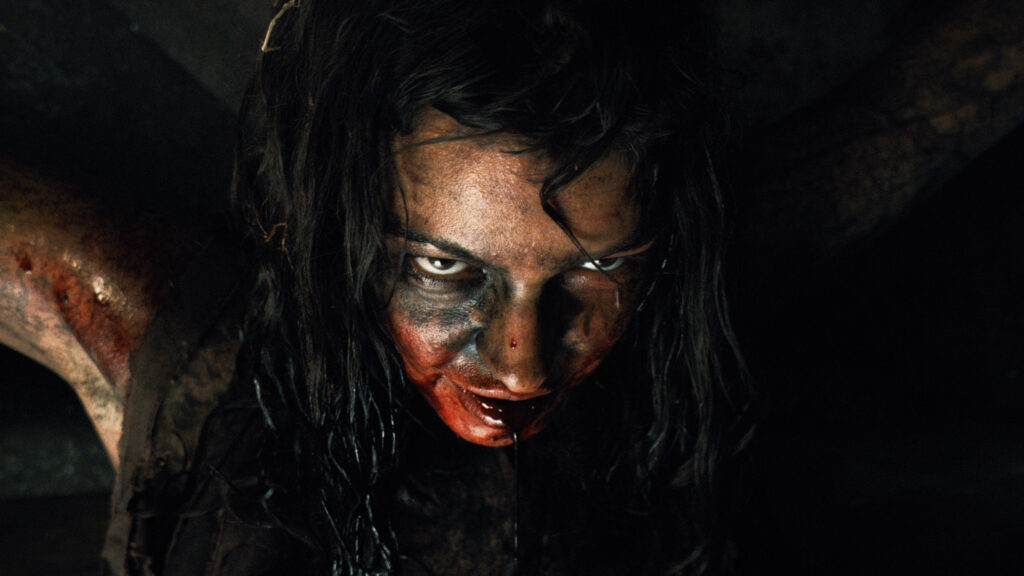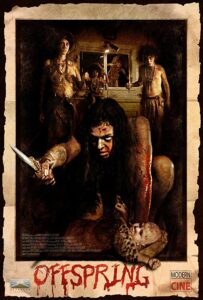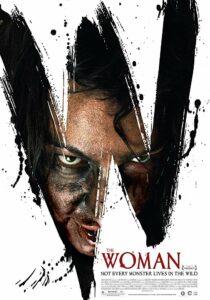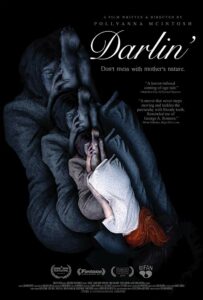
OFFSPRING ** USA 2009 Dir: Andrew van den Houten. 80 mins
 Adapted by Jack Ketchum from his own novel sequel to the superior “The Off Season”, this is a tacky poor man’s THE HILLS HAVE EYES. Retired, hard-drinking cop Art Hindle is dragged out of retirement when the brutal murder of a young woman by feral kids has strong parallels to an earlier, infamous case. A sighting of a wild naked girl near his house makes him suspect a local hippy commune, unaware she’s part of a bunch of cannibalistic descendants of an 18th century lighthouse keeper, who have a particular taste for new born babies. With a miserable looking Hindle sleepwalking through the part and the whiniest horror movie character since Franklin in THE TEXAS CHAIN SAW MASSACRE, you will inevitably end up rooting for the cannibal clan, whose extended scenes in their lair endearingly recalls those old Hammer prehistoric flicks in which you would have to sit through a lot of cavemen grunting to get the majesty of Martine Beswick in a designer prehistoric bikini. The movie is notable for a particularly inept police force, the kind of local authorities who sit and watch the film’s annoying eight year old protagonist having a tree-house axe fight with a Wild Kid. The dialogue is often hilariously bad (“This was a really nice guy…” says a cop upon discovering a gruesomely ravaged corpse) and so much of it is awkwardly staged and amateurishly directed. In a way, however, OFFSPRING inadvertently captures the look and feel of a 1980’s “video nasty” with its poor production values and extreme content. An intestine-pulling home invasion set piece echoes the caravan violation in HILLS and the film has some of the most savage violence of recent American horror, with feral kids shot in the head, eyeball-poking and an admittedly bravura cranial bisection. The moment in which a pointy-toothed grinning weirdo bites down on a gratuitously naked woman’s vagina is fairly typical of the amusingly leery tone. Though, for most, it’s only raison d’etre is to set up the feral character known only as “Woman”, played by Pollyanna McIntosh for two subsequent, more professional spin-offs.
Adapted by Jack Ketchum from his own novel sequel to the superior “The Off Season”, this is a tacky poor man’s THE HILLS HAVE EYES. Retired, hard-drinking cop Art Hindle is dragged out of retirement when the brutal murder of a young woman by feral kids has strong parallels to an earlier, infamous case. A sighting of a wild naked girl near his house makes him suspect a local hippy commune, unaware she’s part of a bunch of cannibalistic descendants of an 18th century lighthouse keeper, who have a particular taste for new born babies. With a miserable looking Hindle sleepwalking through the part and the whiniest horror movie character since Franklin in THE TEXAS CHAIN SAW MASSACRE, you will inevitably end up rooting for the cannibal clan, whose extended scenes in their lair endearingly recalls those old Hammer prehistoric flicks in which you would have to sit through a lot of cavemen grunting to get the majesty of Martine Beswick in a designer prehistoric bikini. The movie is notable for a particularly inept police force, the kind of local authorities who sit and watch the film’s annoying eight year old protagonist having a tree-house axe fight with a Wild Kid. The dialogue is often hilariously bad (“This was a really nice guy…” says a cop upon discovering a gruesomely ravaged corpse) and so much of it is awkwardly staged and amateurishly directed. In a way, however, OFFSPRING inadvertently captures the look and feel of a 1980’s “video nasty” with its poor production values and extreme content. An intestine-pulling home invasion set piece echoes the caravan violation in HILLS and the film has some of the most savage violence of recent American horror, with feral kids shot in the head, eyeball-poking and an admittedly bravura cranial bisection. The moment in which a pointy-toothed grinning weirdo bites down on a gratuitously naked woman’s vagina is fairly typical of the amusingly leery tone. Though, for most, it’s only raison d’etre is to set up the feral character known only as “Woman”, played by Pollyanna McIntosh for two subsequent, more professional spin-offs.
THE WOMAN **** USA 2011 Dir: Lucky McKee. 103 mins
 Jack Ketchum teamed up with the talented Lucky McKee to craft the simultaneously released book and movie THE WOMAN, conceived as an extension of characters and themes from “The Off Season” and “Offspring” and riffing on the familiar modern American horror theme of how, at heart, we are all savages regardless of how conventional our upbringing and family life may be. Like the earlier Ketchum adaptation THE GIRL NEXT DOOR, this pivots around an extended, disturbing scenario of a woman held captive, with a child complicit in the abuse doled out to the “victim”. The characters’ objectification of an initially helpless, captured woman also has strong parallels to the powerful indie DEADGIRL, itself harbouring the nihilistic edge of Ketchum’s horror fiction. Here, the focus is on the middle-class marriage between subservient housewife Angela Bettis (McKee’s typically excellent muse) and gun-happy, arrogant jerk / court officer Sean Bridgers. While hunting, Bridgers spots OFFSPRING’s wild “Woman” (Pollyanna McIntosh) capturing food in a stream and takes her home to show some suburban hospitality. In other words, she’s chained to a wall in the family cellar and treated as a pet as part of his mission to make her obedient and free her of her “baser instincts”. The movie becomes an increasingly uncomfortable extreme domestic satire as Dad teaches his kids to take care of The Woman – cleaning her up, teaching her to feed from a bowl.
Jack Ketchum teamed up with the talented Lucky McKee to craft the simultaneously released book and movie THE WOMAN, conceived as an extension of characters and themes from “The Off Season” and “Offspring” and riffing on the familiar modern American horror theme of how, at heart, we are all savages regardless of how conventional our upbringing and family life may be. Like the earlier Ketchum adaptation THE GIRL NEXT DOOR, this pivots around an extended, disturbing scenario of a woman held captive, with a child complicit in the abuse doled out to the “victim”. The characters’ objectification of an initially helpless, captured woman also has strong parallels to the powerful indie DEADGIRL, itself harbouring the nihilistic edge of Ketchum’s horror fiction. Here, the focus is on the middle-class marriage between subservient housewife Angela Bettis (McKee’s typically excellent muse) and gun-happy, arrogant jerk / court officer Sean Bridgers. While hunting, Bridgers spots OFFSPRING’s wild “Woman” (Pollyanna McIntosh) capturing food in a stream and takes her home to show some suburban hospitality. In other words, she’s chained to a wall in the family cellar and treated as a pet as part of his mission to make her obedient and free her of her “baser instincts”. The movie becomes an increasingly uncomfortable extreme domestic satire as Dad teaches his kids to take care of The Woman – cleaning her up, teaching her to feed from a bowl.
This captures the kind of upsetting physical and psychological horror that dominates Ketchum’s fiction: at one point, Bridgers’ impressionable adolescent son (Zach Rand) secretly watches as his Dad rapes the unresponsive wild woman in the cellar, while McKee cruelly cuts to a sobbing Bettis alone in bed, all too aware of why her husband is not there with her. At one of the grimmest points, Bridgers scoffs “boys will be boys” when he discovers Rand has been sneaking down to the cellar to grope and abuse the woman – the true extent of which is discreetly conveyed but will be too much to take for many viewers. Away from the cellar, THE WOMAN is just as distressing in capturing the daily abuse meted out to Bettis courtesy of one of the most detestable male characters in recent horror history. There is jet black humour to be found, as in all of McKee’s film work, but it’s mostly just harrowing. Kudos to the make up effects work of Robert Kurtzman for the heart-munching, face-eating, child-killing climactic carnage, with characters both odious and sympathetic perishing in equally gruesome ways. And particular praise is due to Bridgers, Bettis and the astonishing McIntosh for their fearless performances.
DARLIN’ *** USA 2019 Dir: Pollyanna McIntosh. 100 mins
 Having notched up a diverse range of performances since THE WOMAN (2011), Pollyanna McIntosh returns to co-write and direct this spin off from the Jack Ketchum / Lucky McKee projects. The Woman (McIntosh) drops off her feral teen daughter Darlin’ (Lauryn Canny) at a hospital, where she is immediately struck down by an ambulance. Shown rare tenderness courtesy of a sympathetic gay nurse, Darlin’ is taken under the wing of Thomas Francis Murphy’s Catholic reform home for girls, where the Cardinal is keen to exploit this uncivilised character for his own ends – recording footage of Darlin’ in all her untamed glory with the intent of capturing her later in a reformed state and claiming his own personal “Eve”. As director, McIntosh juggles various character beats and tonal shifts, though the most involving element is the domestication of Darlin’ (well-played by Canny) as she learns how to become a dutiful woman, slaps on a “happy” face, recites mantras parrot-fashion and dresses the same as everyone else. The movie’s target is an obvious one and it hammers home the central theme of Darlin’s exploitation in supposedly “respectable” society by a lunatic who claims to be a direct descendant of the Apostle and insists “God wants to see you without any clothes on”. Darlin’s journey is juxtaposed with cutaways to The Woman in either broadly comedic culture-clash scenarios (her first car journey) or in flippant kill scenes in which unsympathetic authority figures and drunks have their faces chewed off. The harder-edged shock tactics of THE WOMAN are muted but, as either horror or satire, this never hits the bullseye – cluttered by too many characters and never settling on a singular focus or mood. It comes to life briefly during the bloody, Communion-set finale but the best things about this picture (dedicated to the memory of Ketchum, who died last year) are the performances of the two women.
Having notched up a diverse range of performances since THE WOMAN (2011), Pollyanna McIntosh returns to co-write and direct this spin off from the Jack Ketchum / Lucky McKee projects. The Woman (McIntosh) drops off her feral teen daughter Darlin’ (Lauryn Canny) at a hospital, where she is immediately struck down by an ambulance. Shown rare tenderness courtesy of a sympathetic gay nurse, Darlin’ is taken under the wing of Thomas Francis Murphy’s Catholic reform home for girls, where the Cardinal is keen to exploit this uncivilised character for his own ends – recording footage of Darlin’ in all her untamed glory with the intent of capturing her later in a reformed state and claiming his own personal “Eve”. As director, McIntosh juggles various character beats and tonal shifts, though the most involving element is the domestication of Darlin’ (well-played by Canny) as she learns how to become a dutiful woman, slaps on a “happy” face, recites mantras parrot-fashion and dresses the same as everyone else. The movie’s target is an obvious one and it hammers home the central theme of Darlin’s exploitation in supposedly “respectable” society by a lunatic who claims to be a direct descendant of the Apostle and insists “God wants to see you without any clothes on”. Darlin’s journey is juxtaposed with cutaways to The Woman in either broadly comedic culture-clash scenarios (her first car journey) or in flippant kill scenes in which unsympathetic authority figures and drunks have their faces chewed off. The harder-edged shock tactics of THE WOMAN are muted but, as either horror or satire, this never hits the bullseye – cluttered by too many characters and never settling on a singular focus or mood. It comes to life briefly during the bloody, Communion-set finale but the best things about this picture (dedicated to the memory of Ketchum, who died last year) are the performances of the two women.
Reviews by Steven West
